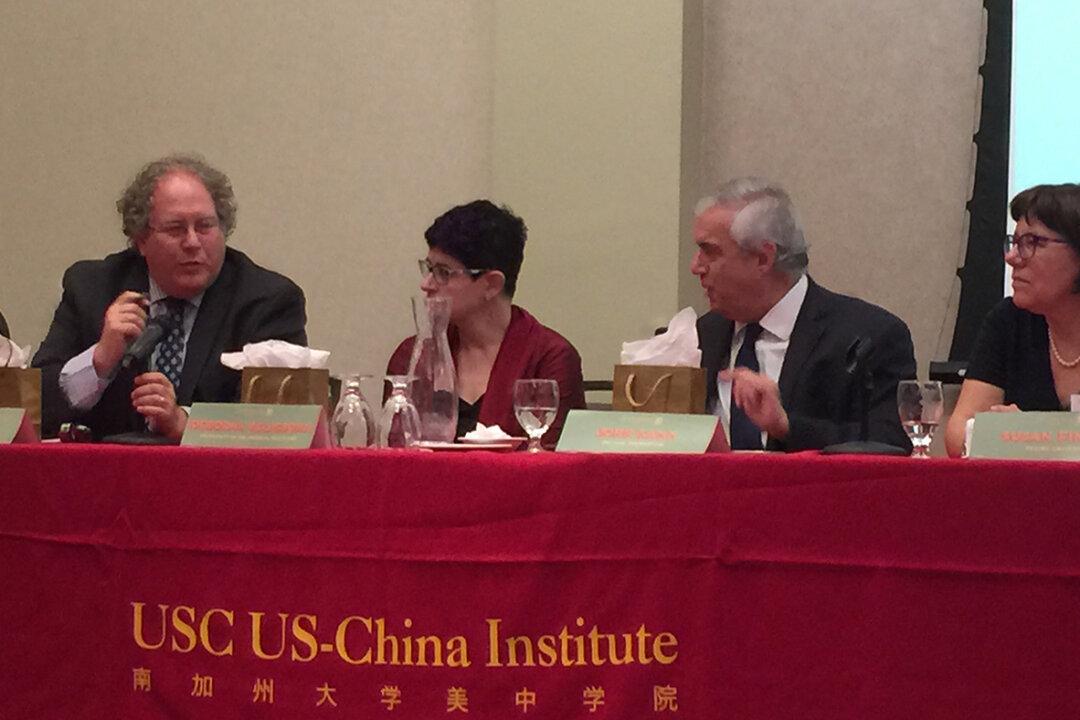LOS ANGELES—China’s increasing American investment and what some see as meddling in U.S. affairs, along with its aggression in the East and South China Seas, are getting more attention from US scholars, with some considering the actions a threat to the US.
At the University of Southern California (USC) US-China Institute’s 10th Anniversary conference “The China Card: Politics Vs. Policy” at the USC Radisson Hotel on Sep 29, 20 professors spoke in five different panel discussions on topics such as economic ties, environmental worries, security challenges, and the roles of various agencies and organizations in US-China relations.
Clayton Dube, director of the USC US-China Institute, said that since North America and Europe are stable markets, Chinese companies have begun to invest more globally, compared to foreign companies investing in China. As of 2014, Chinese investments abroad amounted to $123 billion, while investment in China is about $120 billion.
Last year, $15 to $16 billion was invested by Chinese corporations in the US. California is the biggest recipient for Chinese investment, such as in hotels, biotech industries and Silicon Valley research development, but most of the investment comes from property development.
These Chinese property developers are increasingly targeting individual Chinese home buyers, who spent nearly $30 billion last year on single-family homes and condos in the US.
“On a corner in Beverly Hills, two wealthy developers are looking to develop property,” Dube said. “One of these owns the Beverly Hilton hotel. The other is Wanda (one of China’s largest and highest-profile companies), and they disagree whose project should go first, whose project should be permitted at the largest level... One side is playing the so-called China card.”
Wanda was accused by a union that services the Beverly Hilton Hotel of trying to buy a US election by contributing to a ballot proposal campaign, which is illegal. However, American subsidiaries of foreign companies are allowed to contribute, and the complaint was dismissed by California’s Fair Political Practices Commission on October 6 after it was claimed the money came from a Wanda US subsidiary based in Chicago.
Chinese companies are also hiring more U.S. talent. In a job search on June 26, 2016, the company Huawei advertised 454 job openings in the U.S.
According to a Gallup poll in 2016, half of Americans say they believe China is the world’s leading economic power, not the United States.
“Chinese companies are buying up American film studios and movie theaters at an alarming rate,” according to the narration from the video “China Owns Us” by Rick Berman, part of which was shown during the conference. “In 2012, the Chinese firm Dalian-Wanda, whose founder and chairman has strong ties to the Chinese Communist Party, bought AMC entertainment. AMC then turned around and reached a purchase agreement with Carmike Cinemas. If the deal closes, it would form the country’s largest chain with more than 8000 movie screens. Wanda has also bought Legendary Entertainment, a major Hollywood film studio.”
Posturing in the China Seas
On the East and South China Seas issue, the Chinese Communist Party’s island building and other power plays are causing concern.
Mary Beth Long, U.S. Assistant Secretary of Defense for International Security Affairs from 2007 to 2009, said that China is not only increasing its power and the perception of its power in the region, but is also very interested in increasing those powers internationally.
“This growing militia...is becoming increasingly problematic, not only from a freedom of navigation standpoint, but from a military standpoint,” she said.
“These are the so-called Coast Guards, the so-called militia who are fishermen or not in uniform, that are coming from fishing fleets, from local entities, but who are clearly being trained, equipped, and act in coordination with either Chinese Navy or other official Chinese government interest.”
Long also showed further concern, saying, “This is an early indication of a problem that right now is confined to the maritime realm, but could become increasingly difficult should China choose to adopt it in other places or even go so far as to the idea of Chinese diaspora or Chinese citizens in regional countries having some claims to protection of China.”
She believes there is an urgent need to deal with this Chinese aggression, along with Chinese inaction regarding North Korea. These concerns have been addressed by US military officers and pose “an immediate danger to US assets.” She said the new president will have to respond to these issues.
“The time has run out, or is very close to running out, to force the Chinese or coerce the Chinese to deal effectively with North Korea, and the perception that if they won’t, what are we willing to do?”
Human Rights in China
Engagement with China as a US policy has been practiced for several decades. Does engaging business improve the political climate in China? Does democracy and freedom improve human rights in China?
Yasheng Huang, Associate Dean of MIT Sloan School of Management said, “The idea of engagement has been invoked by a number of US Presidents to justify increasing trade, increasing investment with China. And there is debate, and the debate now is more on the side of the view that it does not work.”
During one panel discussion, an audience member asked the question, “Why should Americans, the general American public, care about human rights issues in China other than as part of humanity?”
“It’s a great question, a really good question,” said John Kamm, the founder of The Dui Hua Foundation. “The reason that Americans care is that Americans genuinely love China, love Chinese. That’s been my whole life. It’s just the way I feel.”
Mr. Kamm has engaged the Chinese government in dialogue on human rights, focusing on the treatment of prisoners and conditions in prisons. Dui Hua has submitted requests for information on more than 6,000 prisoners and has helped hundreds, including Falun Gong practitioners, gain early release and better treatment.
Other scholars or professionals who spoke at the event include Victor Yuan of Horizon Group, Jonathan Rothwell from the Gallup Organization, Robert Shrum, Warshaw Chair in Practical Politics at USC, Professor Dali Yang of the University of Chicago, Sun Zhe, adjunct senior research scholar and co-director of China Initiative at the School of International and Public Affairs of Columbia University, Assistant Professor Erin Baggott Carter of USC; Phil Saunders, Director of the Center for the Study of Chinese Military Affairs at the Institute for National Strategic Studies, Susan Finder of Peking University, Barry Naughton of the University of California in San Diego, and Jeremie Waterman, Senior Director of the US Chamber of Commerce in Washington.

